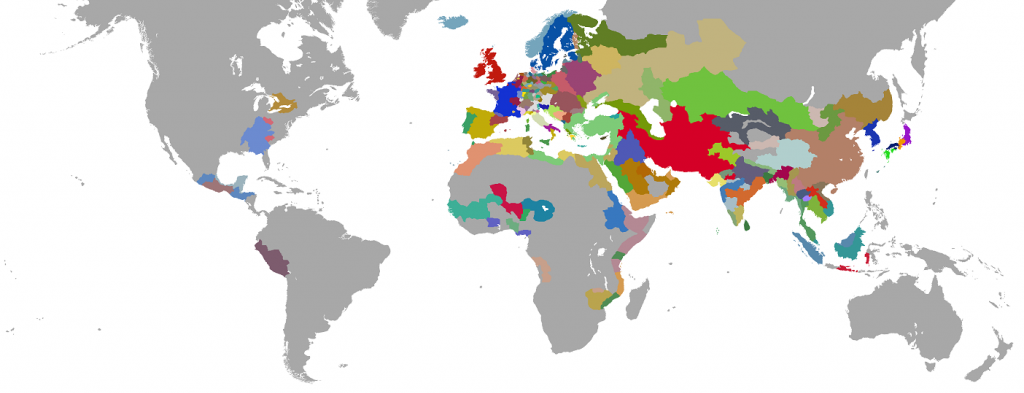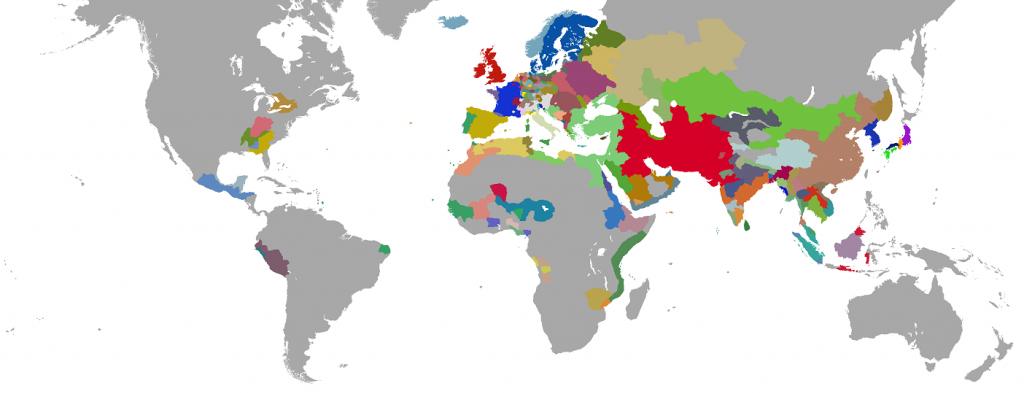Władysław II Jagiełłon
The year is 1399, Wladislaw II has become the sole King of Poland after the death of his wife Queen Jadwiga.
The situation is somewhat favorable, the union between Poland and Lithuania is strong, their combined
military might makes them a force to be feared by their neighbors, and a threat that requires dealing with
perhaps?
Though strong, Poland is surrounded by enemies, jackals hungry to tear us apart piece by piece given the
chance, to the west is the emperor Vaclav, King of Bohemia, to the north our old enemy the Teutonic order and
to the east the King of Muscowy whom lays claim to lands that are rightfully Lithuanian!
The situation is delicate, and requires some astute diplomacy. After much pondering Wladislaw and his court
decide on a course of action, an offer to the knights of the Teutonic order that only a fool would reject. In
return for a mutual alliance and aid against Bohemia the benevolent Kingdom of Poland would agree to aid the
knights in establishing a power base in the northern Holy Roman Empire as a counter balance to the current
imposters who claim the crown.
This was not enough to secure our position of power in the east and thus contingency plans were drawn up in
the case of a coalition against us. An alliance with Austria was signed for mutual benefit in return for the
right to Hungarian lands, an offer that Wladislaw clearly could not offend with refusal.
Shortly after word reached the court that the King of Bohemia had declared a war of aggression on our Habsburg
ally. Initially the request for aid was disputed, polish lives are not to be wasted in petty imperial
disputes. The situation quickly changed when it became evident that a power bloc was forming around us,
bohemia had secured an alliance the the Teutonic order and the king of Muscowy.
At first Wladislaw was shocked, the deal with the knights had declared that they would aid in the destruction
of Bohemia, not join them. The situation was troubling and it became apparent that diplomacy had failed and
that the knights had chosen to betray us. Wladislaw donned his Armour and gathered his arms, he would lead
the army himself to exact his vengeance against the traitorous Teutonic order. Once assembled he force
marched his army of 15,000 north followed by a 10,000 strong reserve force.
Spies on the borders had reported that the Teutonic knights had been assembling their forces in Ostpreussen,
so far 8 regiments had gathered but were unaware of the impending might of Wladislaw soon to crash down
upon them and thus had set up camp awaiting orders.
A week into the campaign and the King of Poland reached the Knights, the element of surprise had devastating
effects. The slaughter was such that the reserve army was unable to hold themselves back and rushed into the
frey. The casualties were high for the knights, though their quality training and equipment meant they
weren't completely defanged and managed to inflict token losses. It wasn't long before the command structure
completely fell apart and the knights retreated to samogitia in an unorganized mass, Wladislaw gave chase.
The superior polish cavalry ran down stragglers during the entire retreat and upon reaching samogitia the
enemy was tired, bloodied and completely demoralized. A surrender was agreed upon and the knights put down
their weapons, the officers expected to be captured and ransomed but Wladislaw now had new plans for the
Teutonic order, it's lands would be completely integrated into the Grand Kingdom of Poland and all traces of
it would be cleansed, the penalty for their treachery. No officer would remain to lay claim to the title of
Hochmeister and no man would remain to take up arms again, given the order the Polish army took no prisoners.
The north had now been subdued, the Lithuanian armies began occupy the territory of the knights and squashing
any resistance that remained, the focus now shifted to the west where the Austrian armies had been holding
out well, considering they were outnumbered by superior troops. With all haste Wladislaw marched his armies
south.
Upon entering Bohemia it was empty of anything that can be considered an army, it was clear they were on the
offensive and thus time was of the essence. Should our Austria ally fall, we were likely to suffer a defeat
we would not recover from sufficiently. Wladislaw entered the Austrian territory and settled in the province
of steirmark, it was mountainous and would provide a great advantage against the Bohemians should they be
foolish enough to attack. To the astonishment of Wladislaw and his generals the Bohemian king readied an
assault, his blood lust must of clouded his mind for such an attack was suicide.
It was early morning, the sun was peering over the horizon, the Polish army had constructed temporary
fortifications, simple palisades and structures from which to funnel the enemy and give our archers an
advantageous field of fire. The calm wind and mild temperature of mid summer had lulled the minds of the
polish to the massacre that was soon to occur, to the bloodiest loss of life Wladislaw would ever experience
in his life. The Bohemian army was numerically superior, a full 18,000 men stood against the Polish 15,000.
They had superior training and superior arms, maybe it wasn't so foolish that the emperor believed the battle
won, only time would tell. The sounds of quiet prayers was soon interrupted by the rumble of feet and horses
advancing up the narrow ravines. The brave Polish soldiers braced themselves as the Bohemians, funneled by
the constructed blockades crashed into a wall of spears. The men in front, crushed onto the points by the men
behind, oblivious to anything but their own lust for battle. Once pinned in they became vulnerable to the
archers positioned on either side of the funnels, falling in droves unable to shield themselves from fire
from multiple directions. At certain points in the battle the casualties were completely incomprehensible,
estimated kills of over 1,000 men to a loss of Polish small enough to count on your hands.
Several days into the battle the Austrian army numbering 15,000 lead by Albrecht IV Von Habsburg himself
joined from the west, they had retreated into the mountains of salzburg to recover until our reinforcements
had arrived. With this new-found manpower the combined Austro-Polish armies began pushing the Bohemians back,
out into the open plains below where our superior numbers would make short work of them. Seeing his strategy
had completely failed, the Bohemian king called for a hurried retreat, a last ditch attempt to consolidate
elsewhere and try again, but the tide had turned and the current had swept him far from safety. Wladislaw and
---- mercilessly pursued the Bohemians all the way north through Sudety into Erz. At this point Wladislaw's
army had been reduced to a mere 3,200 soldiers, receiving the brunt of most of the battles, and decided to
break off and return home to replenish his armies. The Bohemians had been battered and their army was soon
captured.
At the peace table, Wladislaw demanded the secession of Samogitia to Lithuania and Warmia to Poland.
Wladislaw looked kindly on the King of Muscowy whom was too weak to send an army to the aid of his allies,
too busy fighting his own petty wars and thus demanded nothing from him. Austria demanded monetary
reparations for the war, satisfied in the knowledge Bohemia would not be able to recover from such a defeat.
It would be known that this was Wladislaws greatest victory, for the rest of his life would be rather
uneventful, consisting of petty wars subjugating Pomerania, finishing the integration of the Teutonic order
and integrating other vassal states, aiding the Muscovites in their fight against rebels and their annexation
of Tver.











